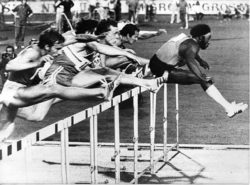Rodney Milburn
Rodney Milburn was born in Opelousas and competed successfully at Southern University in Baton Rouge before becoming the world’s best high hurdler in the early 1970s.

Courtesy of The Louisiana Endowment for the Humanities
Rod Milburn sets another world record. Keystone Press Agency (Photographer)
Track and field standout Rodney Milburn Jr. turned a poverty-stricken childhood into Olympic gold when he won the 110-meter hurdles at the 1972 Summer Olympic Games in Munich, Germany. Milburn was born in Opelousas and competed successfully at Southern University in Baton Rouge before becoming the world’s best high hurdler in the early 1970s. Milburn’s unorthodox style of clearing the high hurdles led him to a twenty-eight-race winning streak at the height of his career. However, after his competitive career wound down and a stint as Southern’s track and field coach ended abruptly, Milburn endured personal strife that led to homelessness and a tragic, premature death at his job at a paper mill in Port Hudson at the age of forty-seven.
Born on March 18, 1950, Milburn was raised in a working-class, largely African American neighborhood on the east side of Opelousas; he was one of seven children born to Rodney Sr., a carpenter, and Mary, a housekeeper-cook. Milburn attended the segregated, all-black J. S. Clark High School, where he progressed from a gangly teen who knocked over every hurdle in his first race to a national-record-breaking high school athlete, under the tutelage of legendary coach Claude Paxton. Clark High School was so strapped for funds that the hurdles were handcrafted by students in the shop class, and Paxton himself mowed the grass that served as the track team’s ramshackle practice area.
The key to Milburn’s turnaround as a hurdler and the jump-start to his world-class competitive career came when he created a new hurdling style in which he led his jump over each obstacle with both arms outstretched, a technique that was revolutionary at the time but is now considered somewhat archaic.
He parlayed that style into collegiate success at Southern and then an undefeated season on the world stage. In 1971 Milburn was unbeaten in twenty-eight races, including fifteen finals. In the Amateur Athletic Union national championships, he ran the 120-yard high hurdles in 13.0 seconds in the semifinals, breaking the thirteen-year-old world record by two-tenths of a second, and he was voted athlete of the year by Track and Field News. “His 1971 season ranks among the greatest in track and field history,” said Craig Masback, chief executive of USA Track & Field, the sport’s governing body.
A slight stumble at the 1972 US Olympic Trials, which caused him to place third in the 110-meter hurdles, was his only blemish in a series of accomplishments that peaked in Munich, where he established the Olympic hurdling record, 13.24 seconds, and tied the world mark.
Milburn turned to the nascent professional running circuit in 1974 and a brief tenure as a professional football player for the Shreveport Steamers of the World Football League in 1975. His professional contracts made him ineligible for the 1976 Summer Olympics, but he was reinstated as an amateur in 1979. However, President Carter’s boycott of the 1980 Olympic Games in Moscow prevented a US team from participating and thus effectively ended Milburn’s competitive career. A brief stint as track coach at his collegiate alma mater ended acrimoniously.
Milburn was honored with induction into the Louisiana Sports Hall of Fame in 1988, but his personal troubles mounted until he was living in a homeless shelter by the mid-1990s and forced to sell plasma to afford cab fare to his new job at a Georgia Pacific paper mill north of Baton Rouge. During one shift at the plant, Milburn apparently slipped into a tank of caustic chemicals, leading to an early death in 1997. The city of Opelousas honored Milburn by renaming a street after him, and the Opelousas Museum and Interpretive Center includes a permanent exhibit about his life and career.
